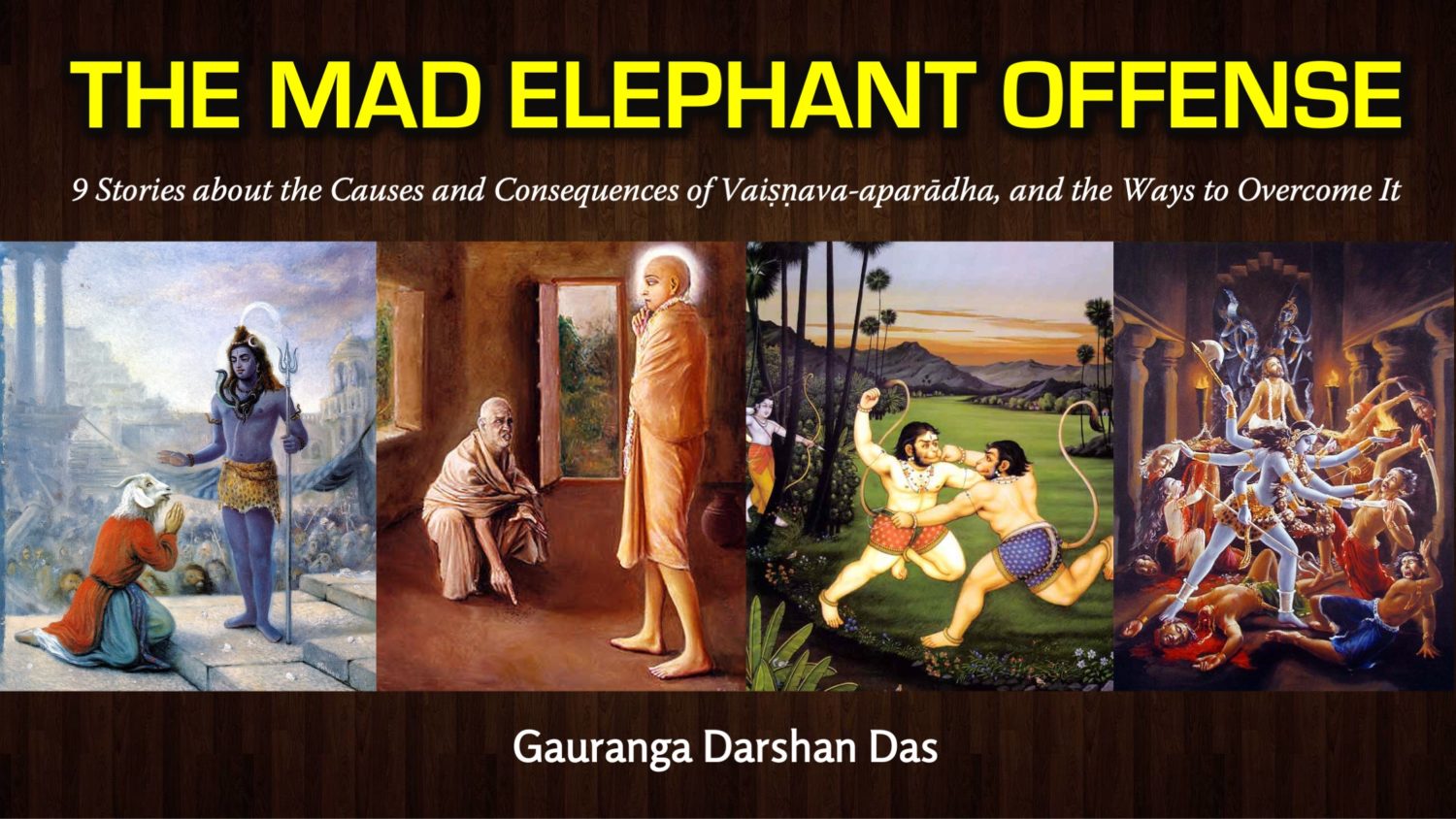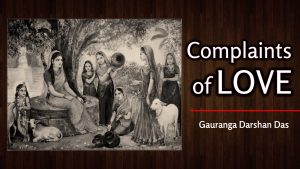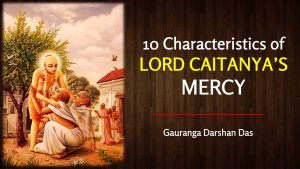The Mad Elephant Offense
by Gauranga Darshan Das
“9 Stories that Reveal the Causes and Consequences of Vaiṣṇava-aparādha, and the Ways to Overcome It”
Devotees are so dear to the Lord who is not only within their hearts, but also keeps them within His heart (sādhavo hṛdayaṁ mahyaṁ. sādhūnāṁ hṛdayaṁ tv aham, SB 9.4.68). The association of such devotees is an integral part of bhakti-yoga, the path of devotion. The mercy of the devotees is the beginning of one’s faith in Bhakti. The blessings and guidance of devotees keep us inspired and nourished in our spiritual journey.
Blaspheming, insulting, or harming such devotees hurts the Lord directly. In this world, it is common to see materialistic people criticizing devotees. But even the devotees who practice bhakti-yoga also sometimes tend to criticize and offend other devotees. Offense to a devotee or vaiṣṇava-aparādha is considered a mad elephant offense. Just as a mad elephant can trample and destroy an entire garden that has been maintained with great care, offense to a devotee can destroy the pious and spiritual credits one has amassed with great endeavor. Is there any relief from this mad offense? Why does one offend devotees in the first place?
This article presents several stories from Śrīmad Bhāgavatam, Śrī Caitanya-caritāmṛta, Rāmāyaṇa and Mahābhārata along with an analysis of the causes and consequences of vaiṣṇava-aparādha; and the ways of overcoming the reaction to vaiṣṇava-aparādha and the tendency to commit vaiṣṇava-aparādha.
Story 1: No Shelter Anywhere in the Universe
Ambarīṣa Mahārāja invited Durvāsā Muni as his guest. But he took a little water to break his Ekādaśī fast, before feeding Durvāsā. Just for that reason, Durvāsā was offended and created a fiery demon with his mystic power to kill Ambarīṣa. Ambarīṣa was tolerant and didn’t retaliate. He didn’t even move an inch from where he was standing. But Lord Viṣṇu’s Sudarśana cakra appeared there at once and killed the fiery demon, and started chasing Durvāsa. Durvāsa fled everywhere in the universe, but he didn’t get shelter anywhere, including the abodes of Lord Śiva and Lord Brahmā. Demon Rāvaṇa also received various benedictions from Lord Śiva and Lord Brahmā, but they could not save him from the arrows of Lord Rāma.
Even the devatās do not and cannot save one who has offended a Vaiṣṇava.
When Durvāsā Muni entered Vaikuṇṭha and fell at the feet of Lord Viṣṇu, Lord Viṣṇu made him realize his offense to Ambarīṣa. Durvāsā, being a brāhmaṇa and a sage, considered himself superior to Ambarīṣa who was a kṣatriya and a householder. The Lord, however, doesn’t care about one’s temporary varṇa or āśrama. He established that the position of a Vaiṣṇava is greater than that of a brāhmaṇa. The Lord conclusively said that Durvāsā could save his life only by the mercy of Ambarīṣa, whom he had attempted to kill earlier. Finally, Durvāsā realized his mistake. He had to keep aside his false ego to save his life. He approached Ambarīṣa and fell at his feet. Ambarīṣa prayed to Sudarśana cakra to excuse Durvāsā.
Even the Lord doesn’t forgive one who has offended His devotees. One can be relieved from the effect of vaiṣṇava-aparādha only by begging forgiveness directly from the devotee whom one has offended.
False ego, is not only the cause of offensive behavior but also the inhibitor of our inclination to seek forgiveness. But if we keep aside our ego and humble ourselves in front of Vaiṣṇavas, we become recipients of their mercy and the Lord’s mercy as well.
Story 2: Longed for Powers but Lost Lives
Jaḍa Bharata was a great devotee of Lord Viṣṇu, but he acted like a dull man externally, to avoid materialistic association. Once, he was caught by a group of dacoits who intended to sacrifice him in front of goddess Kālī, to get some material powers. As a part of their concocted ritual, they tried to behead Jaḍa Bharata with a sword. Jaḍa Bharata didn’t do anything to retaliate against the dacoits. Mother Kālī however couldn’t tolerate this offense to a Vaiṣṇava, because she was a great devotee of Lord Viṣṇu, and is therefore called Vaiṣṇavī. Her deity broke open, and she manifested personally in front of the dacoits and chopped off the heads of her so-called devotees with her sword. That is the result of offense to a devotee.
A devotee may tolerate offense against oneself, but not an offense committed against another devotee. Offense to a devotee pains the heart of the Lord and His other devotees too.
One needs to seek spiritual guidance from devotees, rather than trying to exploit them for one’s material and selfish purposes.
Story 3: Repentance Relieves one from the Reaction
Once a king named Rahūgaṇa was traveling in a palanquin. His servants needed a person to carry the palanquin and found Jaḍa Bharata. Jaḍa Bharata was made to carry the king’s palanquin but walked erratically, being careful not to step on the ants on the road. This angered Rahūgaṇa, who then chastised Jaḍa Bharata severely and threatened to punish him. Jaḍa Bharata turned around and spoke some words of wisdom, “I am a self-realized soul acting like a mad man. There is no use punishing a self-realized soul or a mad man.”
Owing to his good sense, King Rahūgaṇa realized that he had offended a great soul, not only by forcefully engaging him in carrying his palanquin but also by blaspheming him arrogantly. Rahūgaṇa immediately fell that the feet of Jaḍa Bharata and begged apologies with a remorseful heart.
By honestly repenting for one’s offensive act and sincerely begging forgiveness, the offender will be relieved from the grave reaction of vaiṣṇava-aparādha.
Story 4: The Causal Chain of Offenses
Dakṣa Prajāpati, the son of Brahmā, was an expert progenitor. He was very proud of his position and was envious of Lord Śiva’s exalted position as a prominent devatā. Once, he publicly criticized and cursed Śiva in the presence of many devatās and sages. He also maliciously commented that Śiva was a monkey-eyed rascal unworthy of marrying his daughter Sati. In the rage of his anger, he also disrespectfully addressed his father Lord Brahmā as Parameṣṭhi, who forced him to offer his daughter in marriage to “unqualified” Śiva! But Lord Śiva was tolerant.
Later, Dakṣa organized a great sacrifice and invited several devatās and sages, but not Sati and Śiva. Still, Sati went to that uninvited sacrifice out of her affection for her father, Dakṣa. But Dakṣa neglected her. Being unable to tolerate the cold response of Dakṣa, Sati gave up her life. Being so hardhearted, Dakṣa didn’t even try to stop his daughter.
Envy and offense towards one devotee can also lead to offenses towards other devotees.
This time Śiva didn’t tolerate Dakṣa’s offense. He had sent a ferocious personality named Vīrabhadra, who destroyed the sacrifice of Dakṣa and beheaded him. Later, by Lord Brahmā’s intervention, Śiva revived Dakṣa by offering him a goat head.
In the next life, Dakṣa was born in a kṣatriya family, as the son of the Pracetās. Although he worshiped Lord Viṣṇu and got His darśana, still due to the traces of his previous offenses, he was not purified. Dakṣa once severely blasphemed Nārada Muni for teaching the path of devotion and renunciation to Dakṣa’s sons. Dakṣa criticized Nārada as a fake sādhu who defamed Lord Viṣṇu, as sin personified, and so on. Dakṣa even cursed Nārada Muni not to have any permanent residence anywhere. This offense of Dakṣa towards Nārada Muni resulted from his offense to Śiva in his past life. Offense against one Vaiṣṇava can lead to offenses towards many other Vaiṣṇavas, if one doesn’t honestly curb such a mentality.
Mentally harboring envy towards a Vaiṣṇava makes one commit offenses to them verbally and physically. Such an offensive mentality makes one offend multiple devotees. Thus, one should very carefully curb such an envious mentality.
Envy towards a person is an indirect appreciation of that person. Better to directly appreciate them. Further, one needs to understand that without the Lord’s sanction no one can become successful or great. So, instead of envying great persons, appreciate the Lord’s blessings upon them and become an object of their mercy, and the Lord’s mercy as well.
Lord Kapila, an incarnation of Lord Viṣṇu, taught, “Even if one flawlessly worships Me with perfect paraphernalia, if one offends and hates My devotees, I consider their worship as oblations into ashes.”
Story 5: Greed that Ruined the Family
Duryodhana greatly offended the Pāṇḍavas in many ways. He was very greedy for the throne of Hastināpura and wanted to eliminate the Pāṇḍavas, whom he considered a threat, in every possible way. He was supported by his physically and spiritually blind father Dhṛtarāṣṭra, and assisted by his evil associates like Śakuni, Duhṣāsana, and Karṇa. Even at a young age, he tried to kill Bhīma by administering poison. In addition, he tried to burn the Pāṇḍavas by setting fire to their house, and he usurped their kingdom by cheating them in a gambling match and also attempted to insult their virtuous wife, Draupadī, by disrobing her in public.
Duryodhana never listened to any good advice from elders, well-wishers, and even Kṛṣṇa. He severely blasphemed Vidura and banished him from Hastināpura for advising Dhṛtarāṣṭra against his selfish interests. Thus, he offended several Vaiṣṇavas and even the Lord. When Kṛṣṇa came as a peace messenger on behalf of the Pāṇḍavas, Duryodhana arrogantly denied Kṛṣṇa’s request and even tried to arrest Kṛṣṇa. What is the possibility for such an adamant offender to even think of apologizing for his offenses? Hence, the Kurukṣetra war was inevitable.
Arjuna did not like to fight with his cousins in the war, but Kṛṣṇa wanted Duryodhana and his supporters to be punished. Duryodhana, greedy for the full kingdom, didn’t want to share it with his cousins. He could have easily retained half the kingdom by simply befriending the Pāṇḍavas, but unfortunately, he lost the entire kingdom along with the lives of all his brothers and his own. His downfall is a great lesson for those who offend the devotees and the Lord.
Even if a devotee excuses an offender, the Lord doesn’t tolerate any offense against His devotees.
So one must endeavor to keep aside one’s greed and pride, and befriend the Lord’s devotees. Thus one can be saved from offensive mentalities and reactions.
Story 6: One’s Offense Affects One’s Associates Too
Rāmacandra Khān was a landlord in Benapole area. He was very envious of Haridāsa Ṭhākura, a respected Vaiṣṇava in that place. To impress upon people that Haridāsa’s character was malicious, Rāmacandra Khān had sent a prostitute to pollute Haridāsa. However, by the mercy of Haridāsa, the prostitute was transformed into a great Vaiṣṇavī and gave up her illicit profession. She agreed to act as an instrument in the hands of Rāmacandra Khān out of her ignorance, but she didn’t envy Haridāsa. She was therefore liberated from her sinful life. However, Rāmacandra Khān deliberately tried to defame Haridāsa out of his sheer jealousy.
As a result of his offense to Haridāsa, Rāmacandra Khān offended Lord Nityānanda Prabhu as well. He didn’t allow Lord Nityānanda to stay in his courtyard when the Lord arrived at his place. Later Rāmacandra Khān, his entire family, and village were tormented by a meat-eating government official.
Offense to advanced devotees not only affects the offender, but also affects those who are connected to the offender.
Knowing that one’s offensive activities do not just ruin one’s own self, but affect others as well, one must responsibly behave with devotees, and with everyone else.
Story 7: Criticism that led to material desires
The great saint Mādhavendra Purī was in the last stage of his life. He was chanting Kṛṣṇa’s holy name and crying, “O Lord, when shall I get Your shelter.” Without understanding his loving feelings of separation from Kṛṣṇa, his disciple named Rāmacandra Purī foolishly and fearlessly instructed him, “Why are you crying? You should remember Brahman.” Mādhavendra Purī rebuked him, “Get out, you sinful rascal! I am dying without achieving Kṛṣṇa’s shelter. Now this condemned fool has come to instruct me about Brahman.” Another disciple named Īśvara Purī served Mādhavendra Purī during his last stages and became an object of his heartfelt blessings and became a great lover of Kṛṣṇa. On the other hand, due to his offense to guru, Rāmacandra Purī gradually developed material desires and became critical. Later he even criticized the eating habits of Lord Caitanya whose character was flawless. He thus tormented all the associates of Lord Caitanya who considered him a burden on their heads.
Offenses towards gurus and great devotees lead to material desires, impersonalistic tendencies, and inclinations to criticize Vaiṣnavas.
An offender’s presence and association is not welcomed by other devotees in general.
By pleasing the guru with service, one develops love for Kṛṣṇa. Conversely, by displeasing the guru, one becomes a speculator and a critic. So we need to please devotees by rendering service to them.
Story 8: Gravity Demonstrated by the Lord’s Associates
The Rāmāyaṇa further teaches us the gravity of vaiṣṇava-aparādha through the activities of Lord Rāma’s personal associates. When Lord Rāma, Sītādevī and Lakṣmaṇa were in exile, Bharata came to meet Rāma, along with many residents of Ayodhyā. He intended to beg Rāma to return to Ayodhyā. But seeing him from a distance, Lakṣmaṇa doubted that Bharata was coming to attack Rāma. Lakṣmaṇa of course thought so out of his deep love for Rāma, and deep disappointment that Rāma had been exiled, while Bharata would be the king of Ayodhya, according to Kaikeyī’s desires. Hence, Lakṣmaṇa went to Rāma and asked His permission to punish Bharata. Rāma, knowing the pure heart of Bharata, forbade Lakṣmaṇa and told him to patiently wait and see what Bharata was going to.
Lakṣmaṇa, who doubted Bharata’s intentions, later experienced a similar pain when Sītādevī doubted him. When Sītā requested Lakṣmaṇa to help Rāma who went out to chase the golden deer, Lakṣmaṇa denied. Then Sītā doubted his motivations. Rāma knew this, and later when he killed Rāvaṇa, He didn’t immediately accept Sītā but apparently doubted her for staying in the house of Rāvaṇa for about a year. There are much deeper and more detailed reasons for all these events, but in the context of vaiṣṇava-aparādha, these incidents also teach us the following grave lesson.
The pain one experiences when someone doubts one’s intentions is intense. Therefore, one must not unnecessarily doubt Vaiṣṇavas and thus offend them. Better give a benefit of doubt before judging a Vaiṣṇava.
Story 9: The Only Way Is to Humble Oneself
Sugrīva, the king of the Vanaras, made friendship with Lord Rāma. When they met for the first time, Sugrīva offered a seat to Rāma but didn’t offer a seat to Lakṣmaṇa. Somehow, he thought that Rāma was his friend, and because Lakṣmaṇa was Rāma’s servant, he need not offer a seat to him. Rāma noticed this but kept quiet. At that time, Hanumān immediately broke the tree branch and offered it as a seat to Lakṣmaṇa to sit on. Rāma was pleased to see Hanumān’s respect and timely service.
Later when Sugrīva went to fight with Vāli, Rāma didn’t immediately kill Vāli, although he was capable. Instead, he told Sugrīva that he couldn’t distinguish between him and Vāli as they both looked alike. For Rāma to recognize Sugrīva easily, Lakṣmaṇa placed a garland on the neck of Sugrīva, for which Sugrīva had to bow down in front of Lakṣmaṇa. This made him humble before Lakṣmaṇa, whom he didn’t respect properly earlier. Thus, Rāma taught Sugrīva a lesson for his offense.
The Lord can excuse a person on His account, but not the one who offends His devotee.
Disrespecting a devotee is an offense. One must cultivate a culture of respect towards devotees, despite the circumstantial differences of opinion or disagreements.
What happens to the Bhakti of an Offender?
There are many such stories that reveal the grave consequences of offending devotees. Even if the Vaiṣṇavas do not take offenses seriously, Kṛṣṇa becomes displeased, and the offender’s taste in kṛṣṇa-bhakti will be diminished. The eagerness and enthusiasm of the offender to chant the holy names of Kṛṣṇa, to hear the pastimes of Kṛṣṇa will become weak by offending devotees. Also the more serious the offense is, the more it hampers our spiritual advancement. Śrīmmad Bhāgavatam explains –
āyuḥ śriyaṁ yaśo dharmaṁ
lokān āśiṣa eva ca
hanti śreyāṁsi sarvāṇi
puṁso mahad-atikramaḥ
“When one offends great souls, his life span, opulence, reputation, religion, possessions and good fortune are all destroyed.” (SB 10.4.46)
So, one should be very carefully in dealing with devotees and avoid offenses. The Lord, however, is willing to excuse an offender, provided he genuinely repents for his offense, and begs forgiveness from the devotee, not as a ritual or a formality, but with a sincere heart. Along with seeking forgiveness, one can also render service to the devotees whom one has offended, and try to please them. One should also try to see the good qualities of those devotees and glorify them. Lord Caitanya used to glorify His devotees as if He had five mouths.
Vaishnava-ninda is like poison, but glorification is the nectar that destroys the effect of such poison.
While offenses to devotees hamper one’s spiritual advancement, the blessings of devotees help us advance in spiritual life. So, we should be seeking the blessings of Vaiṣṇavas instead of offending them.




